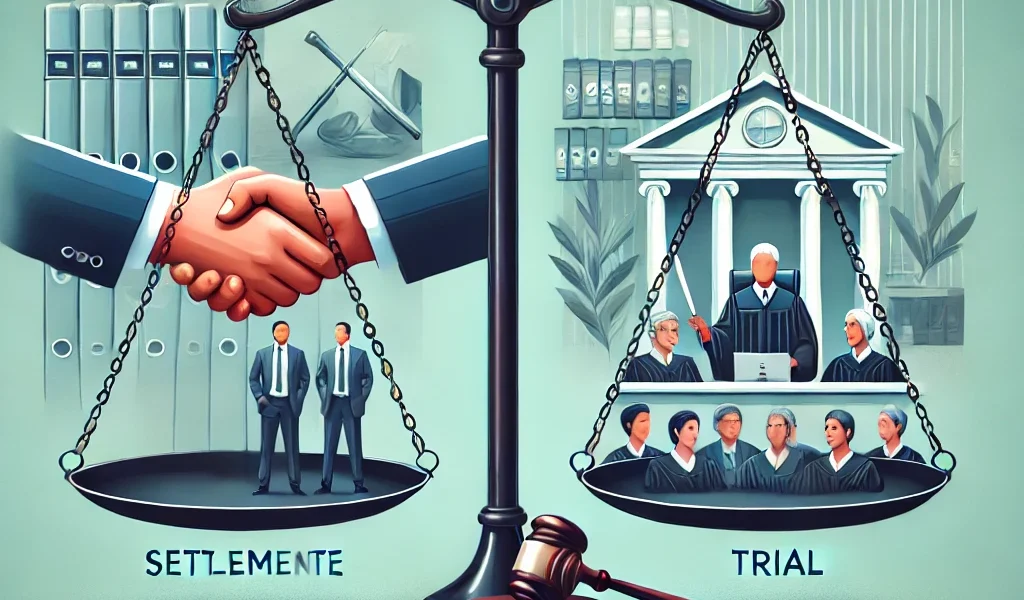Introduction
If you have been injured due to someone else’s negligence, you may be wondering whether to settle your personal injury case out of court or take it to trial. Both options have their advantages and disadvantages, and understanding them can help you make an informed decision.
In this blog, we will explore the differences between settlements and trials, weigh their pros and cons, and help you determine which path may be best for your specific situation.
1. What is a Personal Injury Settlement?
A settlement is an agreement between the injured party (plaintiff) and the at-fault party (defendant) or their insurance company. In this agreement:
- The defendant agrees to pay a specified amount of compensation.
- The plaintiff agrees to drop any further legal claims related to the injury.
Most personal injury cases are settled outside of court, as it is often a quicker and less stressful process.
Pros of Settling a Personal Injury Case
- Faster Resolution: Settlements usually take a few months, whereas trials can take years.
- Lower Legal Costs: Avoiding court saves money on attorney fees, expert witnesses, and other expenses.
- Less Stress: Trials can be emotionally draining, requiring testimony and cross-examination.
- Guaranteed Compensation: Once settled, the plaintiff receives payment without the uncertainty of a trial verdict.
- Privacy: Settlements are typically private, whereas trials are part of the public record.
Cons of Settling a Personal Injury Case
- Lower Compensation: Insurance companies often offer less than what you might win in a trial.
- No Admission of Fault: The defendant does not have to admit wrongdoing, which may not provide a sense of justice.
- No Chance for Appeal: Once settled, you cannot renegotiate or seek further compensation later.
2. What Happens in a Personal Injury Trial?
A trial occurs when both parties cannot agree on a settlement, and the case is presented before a judge or jury. The trial process includes:
- Opening statements from both sides.
- Presentation of evidence and witness testimony.
- Cross-examinations by attorneys.
- Closing arguments.
- A verdict determining fault and damages.
Pros of Going to Trial
- Potential for Higher Compensation: If the jury rules in your favor, the award may be significantly higher than a settlement offer.
- Accountability: A trial verdict can hold the at-fault party publicly responsible for their actions.
- Right to Appeal: If you lose the case, you have the option to appeal the decision.
Cons of Going to Trial
- Time-Consuming: Trials can take months or even years to reach a conclusion.
- Expensive: Legal fees, expert witnesses, and other court-related costs can add up quickly.
- Uncertainty: There is no guarantee that you will win or receive the compensation you seek.
- Emotional Toll: The process can be stressful, requiring extensive involvement and testimony.
3. Factors to Consider When Choosing Between Settlement and Trial
A. Strength of Your Case
- If you have strong evidence (medical records, witness statements, video footage), going to trial may be worth the risk.
- If the evidence is weak, settling may be a safer option.
B. Financial Needs
- If you need immediate compensation for medical bills and lost wages, a settlement ensures faster payment.
- If you can afford to wait, a trial might result in a larger payout.
C. Emotional and Physical Condition
- If you are still recovering from your injury, the stress of a trial may not be ideal.
- If you are prepared for the emotional toll, a trial could be a viable option.
D. Insurance Company’s Offer
- If the insurance company offers a fair amount, settling can be beneficial.
- If the offer is too low, negotiating or proceeding to trial might be necessary.
4. Statistics: Settlement vs. Trial Outcomes
- 95% of personal injury cases settle before trial.
- Only 5% go to court, and of those, plaintiffs win about 50% of the time.
- Jury awards are, on average, 3x higher than settlements.
- However, trials take 2-3 times longer than settlements.
5. When Should You Settle?
- When the offered amount covers all medical expenses, lost wages, and pain and suffering.
- When you want to avoid a long legal battle.
- When the defendant has limited assets and cannot pay more, even if you win in court.
6. When Should You Go to Trial?
- When the insurance company refuses to offer fair compensation.
- When the defendant’s negligence caused severe and long-term harm.
- When you want to set a legal precedent or seek justice beyond just financial compensation.
Conclusion
Both settlements and trials have their advantages and disadvantages. The best option depends on your case’s specifics, your financial needs, and your willingness to go through the legal process.
Consulting an experienced personal injury attorney can help you navigate your options and make the right decision for your situation.
If you’ve been injured, don’t leave money on the table—know your rights and fight for the compensation you deserve!




